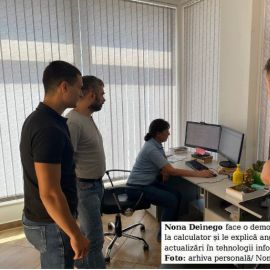back
There are no jobs just for men or just for women, professionalism matters

They broke down prejudices and chose professions they liked. We're talking about a young man from Chisinau who guides primary school pupils into the world of knowledge as a teacher, and a woman from Balti who has been running a renowned IT company for ten years.
They broke down prejudices and chose professions they liked. We're talking about a young man from Chisinau who guides primary school pupils into the world of knowledge as a teacher, and a woman from Balti who has been running a renowned IT company for ten years. Gender equality experts say Moldova's labour market remains segregated and women continue to face discrimination at work, even though we have a law ensuring equal opportunities for women and men. "My first teacher" - a man In Moldova, there are few cases where a woman is employed as a taxi driver or security guard and a man is employed as a seamstress in a textile factory. But Alexei Sorbala has broken stereotypes and has been a primary school teacher at the Academician Constantin Sibirschi high school in Chisinau for seven years. Alexei is one of two male primary school teachers teaching in Russian in Chisinau. He inherited pedagogy from his grandmother, a mathematics teacher, and his love of the profession was nurtured by his former high school teachers, now colleagues. After graduating from the Pedagogical University "Ion Creanga", majoring in "Primary classes and English language", he did an internship at the high school where he taught, and later he was offered to work after school with students. He accepted, only fate had another scenario in store for him. "The very first week, the deputy headmaster asked me to replace a primary school teacher for two days. I was in shock because, until then, even though I had classes, I wasn't responsible for the children all day. It's true, at first it was unusual and I was a bit scared," says Alexei. So it happened that the teacher he replaced had to leave the high school for personal reasons, so in November 2013 Alexei became a teacher and headmaster of the 2nd grade. The first period wasn't easy for him, but his colleagues encouraged and helped him. "After half a year, I realised that I can, but I also want to continue to be a primary school teacher," says the teacher who has adapted his teaching method so that the little ones listen to him and understand him better. "I have created my own method of teaching primary school children how to learn. I was also influenced by Exupéry's book The Little Prince." It's very accurate to say that grown-ups don't understand children. If you want to have a conversation with a child, you have to be a child, to understand, to remember yourself as a child...". Life is created from stereotypes and prejudices, but we don't have to take them into account Already after two years as a pupil, Alexei Sorbala can't imagine a more suitable job for him than that of primary school teacher: "I have never had any prejudices because, as a man, I am a primary school teacher, even though women are usually in this position. I believe that this job is for both women and men. Some men simply think that they will not be able to communicate with children, which is wrong," says Alexei. "Our life is created from stereotypes and prejudices, but we don't have to take that into account," he says. There are no jobs just for men or just for women Nona Deinego is a programmer by profession and has been working in the field for over 30 years. Ten years ago she founded an IT company in the city of Balti. Nona says she has been lucky in her chosen profession and has never felt discriminated against. She is convinced that there are no good or bad professions. "Maybe in construction, where from a biological point of view, women cannot lift heavier weights, but what concerns intellectual effort, in my opinion, there is no difference. Boys and girls work equally well," says Nona. She now leads a team of 57 people, 30 percent of whom are women. "We hire through interviews to determine the level of professionalism of the future employee. In my view, everyone should have equal rights, and only professionalism should count, not gender or age." Women more often choose professions in education, men in engineering and information technology If Alexei Sorbala and Nona Deinego chose their professions without prejudice, data from the National Bureau of Statistics (NBS) show that in 2018, at the level of undergraduate higher education, there was a certain polarization by gender and fields of training. According to the report, "women choose fields such as education sciences, language study, psychology, social work, journalism and communication, accounting, finance and banking, textile manufacturing and processing technologies, hotel services/tourism and leisure. While men are more likely to choose engineering, information and communication technology, personal and property protection." The same report shows that both men and women equally choose to practice law, business and administration. Ineffective public policies In Moldova, the law on ensuring equal opportunities for women and men stipulates that the placement of job advertisements with gender requirements and criteria is discriminatory, but in some cases this provision is violated. "When specific requirements related to age and gender are not directly related to the responsibilities of a job, but they are indicated in the advertisement, it is a blatant violation of a person's rights," says Alexei Buzu, executive director of the Partnership for Development Centre and a gender equality expert. He notes that although we have a law designed to ensure equality between women and men, yet few women in Moldova take up male-dominated positions, as household responsibilities, as well as childcare, are largely assigned to women anyway. "Through public policies in our country these roles are unfortunately not changing. We still have too few places in nurseries. The majority of those on childcare leave are women. In other words, traditional roles in society, instead of being redistributed, are reinforced by inefficient measures at state level. And then a woman who wants to work will always try to find a job that would allow her to combine work and family life. On the other hand, some employers believe that a woman in a particular position will not be able to adequately fulfil her job duties because she has a family. So the employer will prefer to select men," says Alexei Buzu. He is convinced that effective public policies that encourage and support both men and women are needed to avoid labour market segregation. Mariana Jacot


